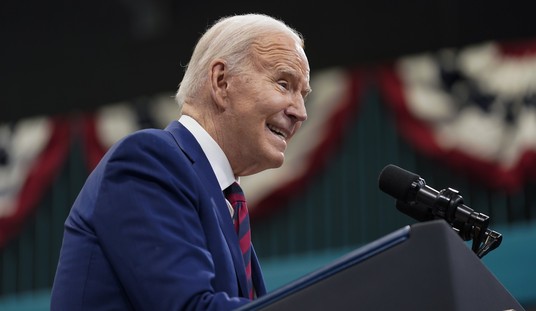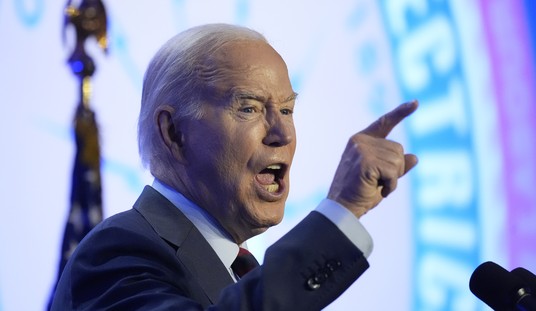Download Podcast | iTunes | Podcast Feed
On today’s edition of Coffee and Markets , Brad Jackson and Ben Domenech and Francis Cianfrocca are joined by ExxonMobil VP Ken Cohen to discuss the ExxonMobil’s earnings, the need for more drilling and why gas prices are so high.
We’re brought to you as always by BigGovernment and Stephen Clouse and Associates . If you’d like to email us, you can do so at coffee[at]newledger.com. We hope you enjoy the show.
Related Links:
Where do your gasoline dollars go?
CNBC: Light sweet crude price history
ExxonMobil’s earnings: The real story you won’t hear in Washington
CNN Poll: Support for increased offshore oil drilling on rise
Ken Cohen at ExxonMobil Perspectives
Follow Brad on Twitter
Follow Ben on Twitter
Follow Francis on Twitter
Follow ExxonMobil on Twitter
Transcript
ExxonMobil’s Ken Cohen Talks Gas Prices, Earnings and Drilling
May 16, 2011
Jackson: Ken, thanks so much for taking the time to join us today. We really appreciate having you on the show.
Cohen: Thanks for asking me.
Jackson: I wanted to start with a question I think is on everyone’s mind, when people go to fill up for gas these days they’ve seen that their prices are significantly higher than they’ve been in the past year.
Why don’t you tell us, what’s behind that? What the real story behind that versus what’s the story you hear from Washington?
Cohen: Yeah. Well, you know first the prices are high. And you know, we all feel it when we’re filling up. And the core reason is the price of crude oil. Crude oil, of course, is the basic component for gasoline. And like all commodities in the world they’ve gone up over the last 12 months. Interestingly, crude is, in terms of the amount that it’s gone up, it’s gone up about half as much, in terms of percentages, than some of the other big globally traded commodities. The difference is crude oil is the basic component of an essential product that everybody needs, which is gasoline.
So, crude oil is now, or during the, for example the past three months it’s been trading at or above $100 a barrel, and a barrel is 42 gallons. So, let’s say if you’re a refiner and you need to go buy crude oil to run through your refinery, you’re paying, let’s just do the math, $100 a barrel. Divide a barrel by 42. That’s just to buy the crude oil. Then you’ve got to ship it to your refinery. You’ve got to have either by, you know, a real transport ship or a pipeline. Then you have to run it through a refinery, which is one of the most complex manufacturing operations we have in the country, we in the US, in the manufacturing sector.
So, we run it through our refinery and then we ship it to distributors who then, in turn, make it available to consumers. So, at the end of all that process you’re starting with your raw oil. The raw crude oil makes up about 70% of the price of a gallon of gasoline. That manufacturing component adds another 18% to the price, and then you have the distribution and the marketing, which is added in there. And then taxes take up about 12%. So, at the end of the day if you’re paying, and I’ll just use rough numbers, $4.00 a gallon for unleaded regular, we ExxonMobil and on the refining end of that, are keeping $.07 of that $4.00. And about, well not about, 18.4 cents is going to the Federal Government as an excise tax, and then State and Local Governments are taking additional amounts out in tax. So, the tax burden on that gallon of gasoline that we’re all paying for is somewhere between $.40 and over $.60. It’s over $.60 if you’re in California and New York, and it’s somewhere in the $.40 to $.60 percent range in every other state in the country. And so unfortunately that’s what is behind it.
Now, why is crude oil so high? Crude oil is high for a couple of reasons. One is that, and here’s the interesting thing, every refiner in the world has plenty of crude oil to run. Inventories of crude are at or around historical levels. So, why is the price up? Well, it’s primarily three reasons. One is the geo-political unrest in many parts of the world that are big crude producers. So, while crude oil is readily available to every refiner in any part of the world, the question that the market is asking, and by “the market” I’m talking about people who trade commodities, they’re wondering not where today’s supply is and the availability. They’re wondering where it’s going to be six months from now, or a year from now, because they’re speculating. They’re trading on crude oil. We don’t do that, but they’re, as you know, there are people in Wall Street, London, what have you, the global traders are. That’s what they do. And they’re just worried about the six months to a year from now.
Second is the supply, there is demand increasing for all commodities, which is what’s driving all commodities up. And that is because the economy in Asia primarily are heating up. They are back to the pre-recession levels. If you look at China’s GDP, India, the brick nations, all up. So, while the economic recovery is still faltering here in North America and Western Europe, it is, most economies are really heating up in the developing part of the world.
And then finally it’s the weakness of the dollar. Commodities are traded in dollars and when the dollar is weak the price of commodities goes up. And because crude is a globally traded commodity, traded in dollars, it costs Americans more for that product than say someone using pounds in Britain or Euros in the European Union. So, I’m sorry, a long winded explanation, but that’s what’s going on.
Cianfrocca: I had one question if I may, just to one of the points that you made. You gave us the ExxonMobil’s margin for downstream. What is it on the upstream side at current price levels?
Cohen: That’s a good question. We, if you’re involved in the full (unintelligible) from the well all the way to the wheels to —
Cianfrocca: In the car, because you’re an integrated major.
Cohen: We are. And if you’re involved in the whole process on the upstream segment, we’re making about $.70 a gallon. And the tax burden, and what government is making on that is over $.70. So, yes. That’s where we’re making the money. It’s on the upstream side of the $.70.
Cianfrocca: So, what’s 70 times 42? I’ve got to do math now.
Cohen: Now, but here’s the interesting thing through on that $.70. We are responsible for about 2% of global crude supply.
Cianfrocca: Yes.
Cohen: We’re a large global refiner. We don’t, and our equity crude globally, on a daily basis we have crude production of about 2.4 million barrels a day of crude. Our global refinery through-put —
Cianfrocca: Yes.
Cohen: — is around, is over 6 million barrels a day. So, we can’t be —
Cianfrocca: So, you’re primarily a downstream company.
Cohen: Yeah. We are out there in the market buying crude oil. We don’t, we cannot supply our refining needs from our own production. And in the United States it’s even more of a downstream operation because of limited access that the industry has to produce crude oil and gas here, because so much of the potential areas are off limits to us because of Government rules and regulations. Our daily crude production in the United States is about 425,000 barrels a day. But our daily through-put needs for our US refineries is 1.7 million barrels a day. So, we’re out buying crude oil. Paying current market price to feed our refining network.
Cianfrocca: You know, one of the questions that I’ve been asking people in oil and gas for months now, is why is this such a large, historically large spread between the West Texas price and the Brent price? And people have told me, it’s probably because the, the rail transport disparity. And what I was going to ask you was, just taking off on what you just said, your refining capacity in the United States.
Would it be correct to say that it’s concentrated in the south, the southern part of the United States? Louisiana, Texas?
Cohen: Our biggest refineries are on the Gulf Coast. Yes.
Cianfrocca: Gulf Coast, okay.
Cohen: So they are relying on —
Cianfrocca: At this point is it the case that you’re having to transport crude from Canada, and from the Bacon down by rail links?
Cohen: Pipeline mostly —
Cianfrocca: Pipeline.
Cohen: — and rail. But Canada, one of the great current stories for energy security and for North America is what’s going on in Canada. We’ll get back to that because the technology has opened up the oil sands in Alberta and (unintelligible).
Cianfrocca: Yes. Yes.
Cohen: But to get to your question directly, I did want to make sure I answered it. West Texas intermediate is a sweet crude. It’s right here, obviously. And it does have quality advantages over Brent, if you’re a refiner.
Cianfrocca: Uh-huh.
Cohen: All right. Now, so there are, there is a West Texas intermediate price. That’s a type of crude oil. Not all, as you know, and your question implies, not all crude oil was created the same.
Cianfrocca: Right. Right.
Cohen: There are light sweet crudes. There are heavy crudes. So, sophisticated refiners have invested heavily to be able to run any type of crude. And so we take what are called disadvantaged crudes. Heavy crudes that require a lot of pounding of the molecules.
Cianfrocca: Yeah.
Cohen: So you’d put a lot of, and that’s our refining chain is a very sophisticated refining chain. And that’s to everyone’s advantage that we can do that. Because we can run, every year we’re introducing 30 to 40 new crudes into our system and that’s good for US consumers. Because if there is a heavy, heavy crude that needs a lot of knocking, a lot of pounding by the refiner, that means there’s just that much more crude oil available to make products for all of us. Now —
Cianfrocca: That also means, I guess, that you could take advantage of the lower price for the heavy grades and the sour grades, right?
Cohen: Exactly. That’s why, and so that’s why consumer’s benefit. We can take a heavy crude that hardly flows through a pipeline almost, if we can get it to our refinery we can then pound it and turn it into usable products for consumers. Gasoline, diesel, what have you.
Cianfrocca: Well, of course the refining costs are a little higher, right?
Cohen: Yeah. Well the fact is —
Cianfrocca: So, some of that benefit comes back?
Cohen: Yeah. And that’s billions. People forget you know, we deal with such large numbers in our business.
Cianfrocca: Yeah.
Cohen: We’ve invested billions to do what I just talked about. For example, this past first quarter when we announced our earnings that caught everyone’s attention and resulted in hearings in Washington. We reported earnings of, you know, $10.7 billion. That was on revenues of $114 billion.
Cianfrocca: Right.
Cohen: So we invest, we’re spending $1 billion a day just to keep our doors open. And the question I ask of senators and congressmen when we get into this discussion, what’s the difference between a business that invests $100 billion to make a $10 billion profit versus a business that invests $100 million and makes a $10 million profit, do you treat those two differently?
Cianfrocca: This is the point that we made the other day, Ben and Brad, that you know, if you are to look at a company such as ExxonMobil where, and I think you’re, right now you’re running an annual revenue number and of course, that’s a global number, not a US number. But it’s something like 2.5% of US GDP, and you have peers like Royal Dutch Shell which is a little bit bigger by revenue Chevron-Texaco almost the same size, and then a bunch of smaller ones, we’re talking about incredibly large numbers. And, you know, you look at your profitability and it’s pretty reasonable.
Cohen: Well —
Cianfrocca: And it’s also in line with the other companies so —
Cohen: Yes.
Cianfrocca: — what are these, you know, to your, specifically to the point you made. We were saying take a look at a company like Microsoft, or Google. Far more profitable, you know, percentage basis and return on equity basis.
Cohen: You know that’s what —
Cianfrocca: It’s like they’re going after the wrong targets if the prize is —
Cohen: Well —
Cianfrocca: Right?
Cohen: — yeah. You’re preaching to the choir here.
Cianfrocca: Yeah.
Cohen: Thank you for mentioning that. And we, the story that we treat, it’s not the story, the facts that we keep trying to point out as an industry, we are directly and indirectly employing 9.2 million Americans in good paying jobs. And as an industry we’re responsible for about 7.5% of the United States GDP. So and the win-win here —
Cianfrocca: Seven and a half percent?
Cohen: Pardon me? 7.5, yeah.
Cianfrocca: That’s ExxonMobil or the industry as a whole?
Cohen: No. No. The industry. Sorry.
Cianfrocca: Okay.
Cohen: Yes.
Cianfrocca: That sounds about right. It’s huge.
Cohen: The win/win here would be, I’ll come back to what you and I were talking about a little while ago is access. If the, if you give us more to do here in this country, gives us more attractive acreage to go explore in off-shore, open up the, reopen the Gulf of Mexico, all parts. Open up promising areas in the outer Continental shelf on both coasts —
Cianfrocca: Yeah.
Cohen: — and then Alaska in the Arctic areas. And we know how to do this responsibly. We know how to do it efficiently. And that would result in more jobs. That would result in more revenue. Far, far, far in excess of what’s being, trying to be raised here by some of these tax proposals that are being bantered about in Washington right now.
Cianfrocca: Well, let me ask you a question specifically to one of the points you just made. There has been some reporting that President Obama very recently is starting to talk about expanding availability of acreage and liberalizing drilling rights in the OCS and in Alaska. This was just over the last couple of days.
My reaction to that was, he’s playing for political advantage and doesn’t intend to be good for it. What do you think?
Cohen: Well, I’m all, I’m an optimist. I’m the worst —
Cianfrocca: I’m an investor so —
Cohen: Well, the worst (unintelligible) it’s the right thing we want to hear. By the way, it’s interesting. I’ve seen several polls now. The polling indicates that Americans are agreeing with what you and I are talking about. That is they understand there is a win-win. Put the industry back to work. Seventy, almost 70%. I saw two different polls, 70% of Americans favor opening up more acreage to the industry. And I think that may explain the comments from the Administration that you’re referring to. Yeah. This is what Americans expect Government and industry to do, to work together here.
Cianfrocca: Well, to that point, to the opinion of Americans that you should, that your industry should have more range to do the exploration, do you feel that you’ve wrapped up the safety and environmental objections that a great many people have?
Cohen: Well, there’s a difference between fact and perception. Let’s, unfortunately let’s go back a year, over a year ago now to the tragedy —
Cianfrocca: Yeah.
Cohen: — in the Gulf of Mexico. Based on the investigation that’s been done, and what’s been made public from that investigation, it looks to most of us in the industry like an event that should never have occurred. It was —
Cianfrocca: It was a mechanical screw up.
Cohen: Yes. If industry’s best practices are, I would say if industry standard practices had been followed by, we would not have had the tragedy, the tragedy that occurred in the Gulf of Mexico. So, that’s the learning from the investigations that have been made public which is a way of trying to make all of us feel, we as an industry, have drilled over 14,000 wells in the deep water without an incident like this occurring. So what, something happened in this incident, obviously, that was different from these other 14,000 wells. And the report is coming back telling us that yes, best practices, good practices were not followed here. What that says is the action of closing the Gulf of Mexico was an over reaction —
Cianfrocca: Yes.
Cohen: — to what occurred. Let us get back to work. And not only let us get back to work, but give us more to do is what the industry is saying.
Cianfrocca: Yeah.
Cohen: So, long winded answer, we know that we can do this safely. The American public can trust the industry to do this well and to not have a repeat. That said, we need to learn from what happened so that there is never a repeat of what occurred in the Gulf of Mexico.
Cianfrocca: Yeah. And just by the nature of things, both politics and public opinion, you’re just going to have to let a certain amount of time go by, keep making that case, and then eventually people will come around. And it’s just a part of the misfortune for everyone that that happened.
Cohen: Yes, it is.
Cianfrocca: So, let me shift gears a bit. I’m curious about your position in the world, okay. You’ve talked about your proportion of global production, global reserves proven and otherwise. And looking at your company and the other American companies and comparing them with people like Pem-X, and Petro Braus, and Saudio-Ramco (phonetic sp.), people that are state owned and they have a vast majority of the world’s reserves, but companies like that aren’t necessarily facing the requirement that you have to keep investing in your properties. In fact, they feed most of their profits into their governments.
So, how does that change your, you know, your competitive landscape and how you do your future planning?
Cohen: Yeah. That’s a great question. We have been dealing with this phenomena now, it’s something that’s occurred starting in the ‘70s, and just, it’s, the make-up of the industries major players has changed from the ‘70s to where we are today. So that ExxonMobil is the largest, I work with the largest non-government owned oil and gas company in the world. And we, I’ll have to give you the exact number, but I think we are number 13, 14 in size now. You know, we’re big and —
Cianfrocca: In revenue? Because I think Royal is a little bigger.
Cohen: We are number 13 or 14 in terms of size. In the, so we compete and we compete with the large national oil companies —
Cianfrocca: Right.
Cohen: — and of course we compete with the other IOC’s the Shell’s, the BP’s, the Chevron’s, Conoco’s.
Cianfrocca: Right.
Cohen: And we love to compete. But obviously we’re competing with public utilities now in some parts of the world. So the competitive landscape has changed. With that said, we have very good business operations in these, in parts of the world we’re in, and work very closely with the National Oil Companies. We bring something, obviously they bring expertise and knowledge of their particular geography, and the geological areas that they oversee. And we bring our R&D. We bring our scientists and our engineers.
Cianfrocca: Yeah.
Cohen: And our project management expertise, because we, we have to be ruthlessly efficient in what we do because of the global nature of our business. And it’s actually a good combination when we team up that way. We each bring our own particular skill sets and after working out an arrangement that’s mutually satisfactory, which takes some time to do. But once we do that, then we have good business operations in various parts of the world.
Jackson: Ken, thanks again for coming on and we really appreciate you talking all this time to run though this stuff with us.
Cohen: Well, I enjoyed talking to you. Happy to do it.
(End of Podcast)













Join the conversation as a VIP Member